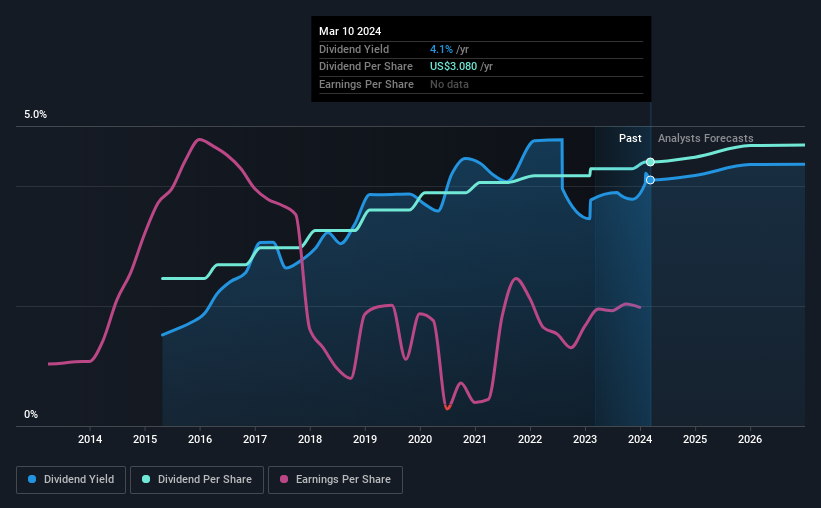Gilead Sciences, Inc. (NASDAQ:GILD) Pays A US$0.77 Dividend In Just Three Days
Readers hoping to buy Gilead Sciences, Inc. (NASDAQ:GILD) for its dividend will need to make their move shortly, as the stock is about to trade ex-dividend. The ex-dividend date is one business day before the record date, which is the cut-off date for shareholders to be present on the company's books to be eligible for a dividend payment. It is important to be aware of the ex-dividend date because any trade on the stock needs to have been settled on or before the record date. Therefore, if you purchase Gilead Sciences' shares on or after the 14th of March, you won't be eligible to receive the dividend, when it is paid on the 28th of March.
The company's next dividend payment will be US$0.77 per share. Last year, in total, the company distributed US$3.08 to shareholders. Calculating the last year's worth of payments shows that Gilead Sciences has a trailing yield of 4.1% on the current share price of US$75.12. Dividends are a major contributor to investment returns for long term holders, but only if the dividend continues to be paid. So we need to check whether the dividend payments are covered, and if earnings are growing.
View our latest analysis for Gilead Sciences
Dividends are typically paid from company earnings. If a company pays more in dividends than it earned in profit, then the dividend could be unsustainable. Gilead Sciences paid out 66% of its earnings to investors last year, a normal payout level for most businesses. That said, even highly profitable companies sometimes might not generate enough cash to pay the dividend, which is why we should always check if the dividend is covered by cash flow. It paid out more than half (51%) of its free cash flow in the past year, which is within an average range for most companies.
It's encouraging to see that the dividend is covered by both profit and cash flow. This generally suggests the dividend is sustainable, as long as earnings don't drop precipitously.
Click here to see the company's payout ratio, plus analyst estimates of its future dividends.
Have Earnings And Dividends Been Growing?
Stocks with flat earnings can still be attractive dividend payers, but it is important to be more conservative with your approach and demand a greater margin for safety when it comes to dividend sustainability. If earnings fall far enough, the company could be forced to cut its dividend. With that in mind, we're not enthused to see that Gilead Sciences's earnings per share have remained effectively flat over the past five years. Better than seeing them fall off a cliff, for sure, but the best dividend stocks grow their earnings meaningfully over the long run. Earnings per share growth has been slim, and the company is already paying out a majority of its earnings. While there is some room to both increase the payout ratio and reinvest in the business, generally the higher a payout ratio goes, the lower a company's prospects for future growth.
Many investors will assess a company's dividend performance by evaluating how much the dividend payments have changed over time. In the past nine years, Gilead Sciences has increased its dividend at approximately 6.7% a year on average.
The Bottom Line
From a dividend perspective, should investors buy or avoid Gilead Sciences? Earnings per share have barely grown, and although Gilead Sciences paid out over half its earnings and free cash flow last year, the payout ratios are within a normal range for most companies. In summary, it's hard to get excited about Gilead Sciences from a dividend perspective.
If you're not too concerned about Gilead Sciences's ability to pay dividends, you should still be mindful of some of the other risks that this business faces. Every company has risks, and we've spotted 3 warning signs for Gilead Sciences you should know about.
A common investing mistake is buying the first interesting stock you see. Here you can find a full list of high-yield dividend stocks.
Have feedback on this article? Concerned about the content? Get in touch with us directly. Alternatively, email editorial-team (at) simplywallst.com.
This article by Simply Wall St is general in nature. We provide commentary based on historical data and analyst forecasts only using an unbiased methodology and our articles are not intended to be financial advice. It does not constitute a recommendation to buy or sell any stock, and does not take account of your objectives, or your financial situation. We aim to bring you long-term focused analysis driven by fundamental data. Note that our analysis may not factor in the latest price-sensitive company announcements or qualitative material. Simply Wall St has no position in any stocks mentioned.

